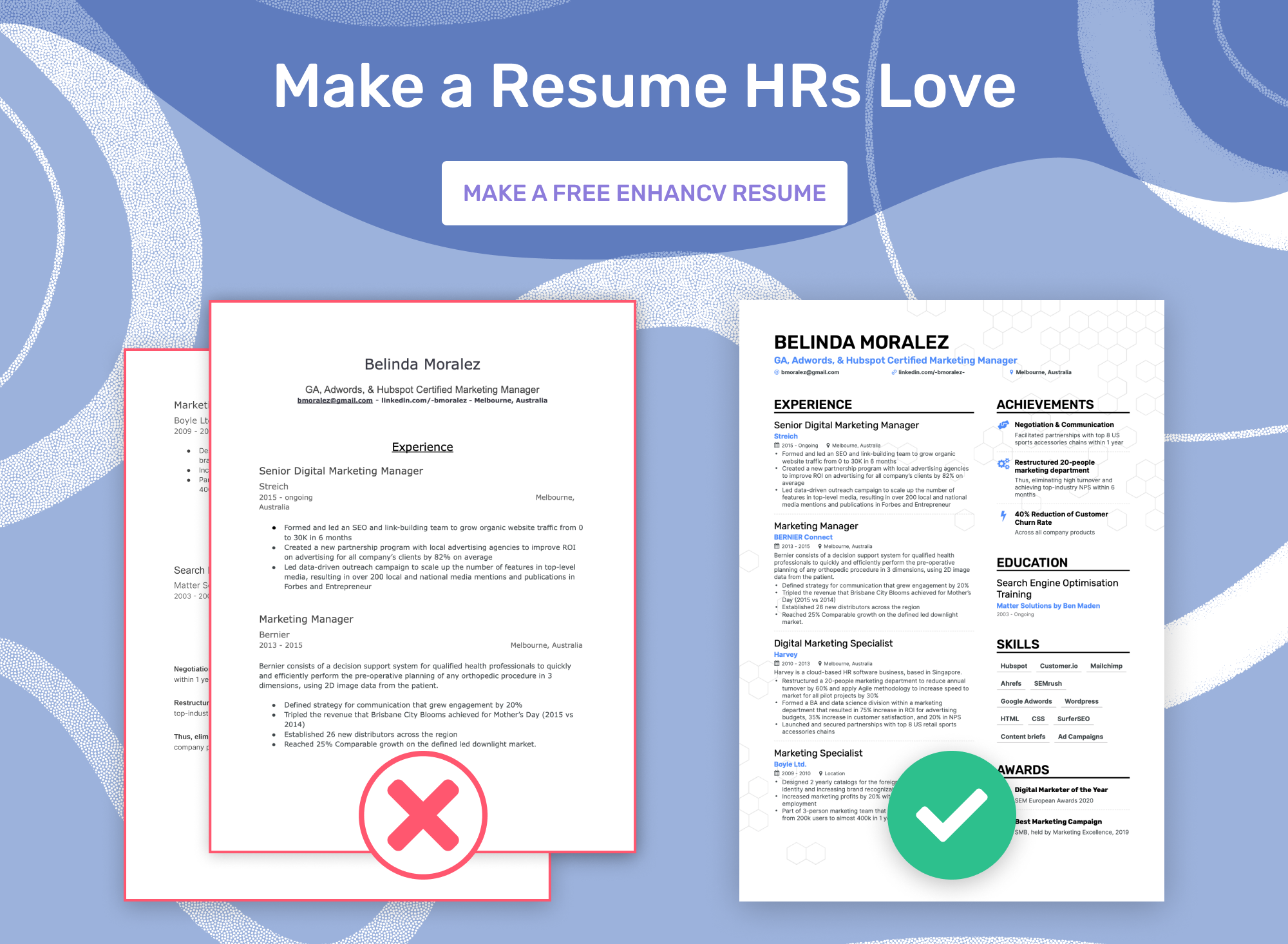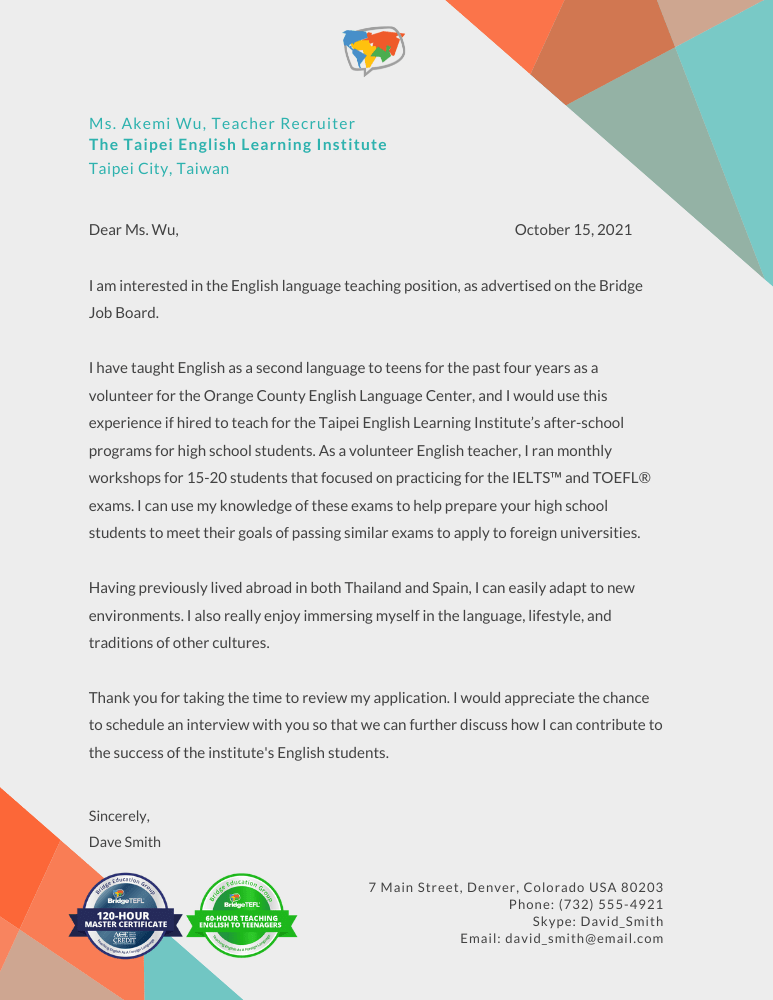Apply For Temporary Employment In a Foreign Country
I am responding to your advertisement for nannies and au pairs that appeared in my local newspaper last Wednesday. I have always wanted to visit a foreign country and would love to have the experience of living in the United States for a while. I am willing to commit to an employment period of one year, as either a nanny or an au pair.
I have done a great deal of baby-sitting, tending both my two younger brothers and the children of several neighbors. I can cook reasonably well and am hard-working and responsible. I have also certified in CPR and have done first aid training with the Red Cross. I have a driver's license, though not, of course, in the US.
I have enclosed a copy of my resume, as was requested in your ad, and look forward to hearing from you.
I am writing in the hope of securing a position as an excavator or laboratory assistant during next year's field work in the International Valley.
I hold a bachelor's degree in archaeology from Springfield University, where I attended a hands-on field school in the summer of 2018. I have also been employed by the state of Kansas the past two summers as a general surveyor. I am currently a paid intern in the office of Dr. John Doe, the State
Historic Preservation Officer for Kansas.
Please find enclosed a copy of my resume and a letter of recommendation from Dr. Doe.
I am very interested in any information you could provide me on temporary employment with your company during the period of June to December. I am a U.S. citizen with excellent qualifications in many areas, including construction, computer network administration, graphic design, and maintenance of office machines.
My goal is to secure a position in one of these areas so that I can learn more about business practices overseas. I currently hold a Bachelor's degree in political science, and intend to continue my studies in the area of international business administration.
My resume is enclosed. Please review it and I will contact you by telephone to discuss my prospects.

How to Write this Application Letter: Expert Tips and Guidelines
Immigration and visa laws vary from country to country, and requirements tend to be both strict and precise. If possible, acquaint yourself with the regulations of the country in which you wish to work before applying for employment.
- Explain what you wish to do or achieve. If possible, mention specific employment-related goals, not simply your desire to work in a foreign country.
- Point out your qualifications for the job.
- Refer to your enclosed resume or a single letter of recommendation or reference. Limit your resume to a single sheet of paper. Do not include copies of certificates or diplomas unless these have been specifically requested.
- Make it easy for the reader to contact you or send you information. Give your e-mail address if you have one, as well as your mailing address. If possible, give phone and FAX numbers. Many large businesses will send a free information packet, but you could offer to pay any expenses if it seems appropriate.
Write Your application in Minutes: Easy Step-by-Step Guide with Sample Sentences and Phrases
1 explain what you wish to do or achieve. if possible, mention specific employment-related goals, not simply your desire to work in a foreign country., sample sentences for step 1.
- I have been most impressed by the work your company is doing with the use of neural networks in industrial process control, and would like to spend a year working with you.
- As we work towards modernizing our Springfield agricultural practices, I have become aware of how much I have to learn. Would it be possible for me to work with you for a year, so that I can gain firsthand experience with up-to-date wheat farming techniques?
- In response to your advertisement for educators willing to work in Springfield for a two-year period, I am both qualified and interested.
- With the current shortage of trained construction workers in your area, I wonder if you can use an expert roofer? I would be pleased to come work in your country for up to two years.
- I am a registered dietician with four years of hospital-based experience, and will be living in Centerville for at least the next eighteen months while my husband is pursuing a graduate degree. I have a special interest in children's nutrition, and would like to work at Centerville Children's Hospital. I anticipate no difficulty in acquiring the appropriate visa.
- I have been working my way around the world for the past two years and would like to spend the next four months living and working in Edinburgh. Do you have an opening for a cashier?
- I have always wanted to spend time in Sweden, and wonder if your agency could send me information about working there as an au pair or nanny?
- Your ad for English-speaking summer camp counselors in the January 14 Springfield Chronicle sounds exactly like what I am looking for. I would thoroughly enjoy spending next summer working with French teenagers, helping with both outdoor activities and English classes.
Key Phrases for Step 1
- a great opportunity to
- am aware that there is a need for
- have an abiding interest in
- have a special interest in
- have a strong desire to
- have always been interested in
- opportunity to serve
- tailor-made for me
- gain firsthand experience
- spend a year or to
- use my education in this fashion
- be a part of
- spend a few months
- spend some time
- gain on-the-job experience in
- apply my skills and training
- use my skills in
- with the current shortage of
- would be delighted to participate in
- would like to
- would enjoy the experience
- would be pleased to
- would thoroughly enjoy
2 Point out your qualifications for the job.
Sample sentences for step 2.
- I have a degree in Computer Engineering from the University of Kansas and would like to pursue a Master's Degree in the future. In the meantime, I am eager to learn all I can about the practical applications of neural networks, and would be delighted to work for a company as widely respected as yours is.
- I have worked on my family's farm since early childhood and have served on a state agricultural task force for the past eighteen months. I am not afraid of hard work, and am both eager and quick to learn.
- I have Kansas State certification for teaching junior high school math and science, and have done so for the past thirteen years. I have also spent hundreds of hours teaching English as a second language to both adults and children on a volunteer basis. I enjoy most sports and have swum competitively and coached soccer teams in our city-wide league.
- I spent six years working for Doe Roofing Company and then ran my own roofing business, with four employees, for the next four years. I would be most interested in working in your country for a time.
- I received my degree from Springfield University and am well acquainted with the cuisine of China, Vietnam, and Indonesia, as well as western favorites. I believe that I could be an asset to your dietetics department in planning attractive and nutritional meals to tempt the generally poor appetites of sick children.
- I have had considerable experience in both checking and customer service, and would need little or no training.
- I graduated from high school eighteen months ago, and have worked in a day care center since then. I am hardworking and good with children, and have a good driving record.
- I am presently working on a degree in Recreation Management. I enjoy hiking and camping in my free time and participate in many different sports. I also took four years of French in high school, which may prove useful in an emergency, although I understand that the purpose of the program is to improve the student's conversational English, and not my French!
Key Phrases for Step 2
- am qualified to
- am a journeyman
- am a certified
- am well acquainted with
- am eager to learn
- am an experienced
- clean driving record
- completed my apprenticeship in
- ever since completing
- hardworking and responsible
- have served on
- have an associate degree in
- have had considerable experience in
- have had four years of experience
- have a bachelor's degree in
- on a volunteer basis
- received on-the-job training
- was responsible for
- was trained by
- would need little if any training
3 Refer to your enclosed resume or a single letter of recommendation or reference. Limit your resume to a single sheet of paper. Do not include copies of certificates or diplomas unless these have been specifically requested.
Sample sentences for step 3.
- I have enclosed my resume, which summarizes my experience and qualifications.
- Please refer to the enclosed resume for further details.
- As you will see from my resume, I have had wide experience in working with teenagers.
- I am enclosing a copy of my resume.
- The details of my work experience are listed on the enclosed resume.
- I have enclosed a letter of recommendation from my last employer.
- I spent my last two summer vacations working for Doe Corporation, and have enclosed a copy of the reference letter Mr. John Doe wrote for me.
- I will be happy to provide letters of reference and college records or transcripts on request.
Key Phrases for Step 3
- a copy of my resume
- are listed on the enclosed
- as you will see from
- for further information
- for details of my
- for a complete list of
- have provided details of my
- have enclosed my resume
- if you would like to see
- letter of recommendation
- letters of reference
- please find my resume
- qualifications and experience
- refer to the enclosed
- to provide further information
- to send you my
- which summarizes my
- will be pleased to
- will be happy to
- wrote the enclosed letter of recommendation
4 Make it easy for the reader to contact you or send you information. Give your e-mail address if you have one, as well as your mailing address. If possible, give phone and FAX numbers. Many large businesses will send a free information packet, but you could offer to pay any expenses if it seems appropriate.
Sample sentences for step 4.
- I will call you in about two weeks to check if you have a suitable vacancy.
- My address is: 1600 Main Street, Springfield, Kansas 12345
- You can reach me by e-mail at [email protected].
- I am enclosing a self-addressed, stamped envelope, and would appreciate hearing from you soon.
- You can reach me at the above address, or as follows: Phone: 555-5555 Fax: 555-5555 E-mail: [email protected]
- I look forward to hearing from you.
- I will be traveling through Centerville at the end of the month and will call you then, but if you would like to contact me in the meantime, please leave a message at 555-5555.
Key Phrases for Step 4
- at the above address
- can reach me at
- can leave a message for me at
- e-mail address is
- for your consideration
- for taking the time to
- have enclosed a
- look forward to
- mailing address is
- please leave a message at
- thank you for
- to your response
- to hearing from you
- would appreciate hearing from you
Recommended Articles
Recommended letter-writing resources.

Action Verbs for Resumes and Cover Letters

Business Letter Format Tips

Letter Closings
Letter Templates & Example
Top Cover Letter Sample for Overseas Job: Stand Out and Get Hired
Hello, job seekers! Are you planning to land a job overseas? If so, have you thought about how you’re going to present yourself to potential employers? One of the most important documents you need to prepare is a cover letter that showcases your skills and qualifications. Fortunately, we have some great cover letter sample for overseas job that you can use as a reference or edit as you please.
A well-crafted cover letter can make all the difference when it comes to snagging a job offer. It’s your opportunity to introduce yourself and explain why you’re the perfect fit for the job. By using our cover letter sample for overseas job, you can easily customize it to meet the employer’s requirements and show them what makes you stand out from other candidates.
The best part is, our cover letter sample for overseas job is free for all to access. We understand how daunting it can be to write a cover letter, especially if English is not your first language. That’s why we’ve provided various examples that you can choose from, depending on the type of job you’re applying for.
In conclusion, we highly recommend using our cover letter sample for overseas job as a guide to help you create your own outstanding cover letter. Remember to tailor it to the specific job you’re applying for and showcase your skills and experience. Good luck in your job search!
The Best Structure for a Cover Letter for Overseas Jobs
Are you considering applying for an overseas job and want to make sure your cover letter stands out? Having a well-structured cover letter can be the key to securing an interview and landing your dream job. Here are some tips on how to structure your cover letter when applying for overseas jobs.
1. Introduction
Start your cover letter with a strong introduction that grabs the reader’s attention. Introduce yourself and explain why you are applying for the position. You can also include a brief overview of your qualifications and experience.
2. Highlight your experience
When applying for overseas jobs, it’s important to highlight your international experience. This could include experience working or traveling overseas, language skills, or experience working with diverse cultures. Make sure to explain how this experience has prepared you for the position you are applying for.
3. Address cultural differences
Many overseas jobs require applicants to address cultural differences in their cover letter. Research the culture of the country or region you are applying for and explain how your experience and skills make you a good fit for the organization’s culture.
4. Highlight your qualifications
Including your qualifications and technical skills is important when applying for overseas jobs. Make sure to highlight your qualifications and explain how they make you a good fit for the position.
5. Closing remarks
End your cover letter with a strong closing statement that summarizes why you are the best candidate for the job. Thank the employer for their consideration and express your eagerness to meet in person to discuss the position further.
In conclusion, when writing your cover letter for an overseas job, it’s important to structure it in a way that highlights your international experience, cultural awareness, qualifications, and technical skills. With a well-structured cover letter, you can increase your chances of securing an interview and ultimately landing your dream job. Good luck!
Cover Letter Samples for Overseas Job
For advancement opportunity.
Dear Hiring Manager,
I am writing to express my strong interest in the opening position of [Job Title] in [Company Name]. I believe that my [Number of Years] years of experience in [Field/Area] and my excellent communication skills make me a perfect fit for your company.
I have worked for [Previous Company] for over [Number of Years] years and have been a part of many successful projects. However, I am now seeking an international work opportunity to advance my career and challenge myself. I am confident that I can bring my knowledge and skills to your team, and I am excited about the prospect of learning and growing within a new culture and environment.
Thank you for considering my application. I look forward to hearing from you soon.
Best regards, [Your Name]
For Cultural Immersion
Dear Sir/Madam,
I am writing to apply for the [Job Title] position at [Company Name]. I am excited at the idea of immersing myself in a new culture and learning from the experiences of others.
I am enthusiastic about the prospect of working for a company like yours that values cross-cultural communication and diversity in the workplace. My [Number of Years] years of experience in [Field/Area] and my language skills in [Language] allow me to interact effectively with people from different backgrounds.
I am confident that my skills and experience make me an excellent candidate for this position. Thank you for considering my application.
Sincerely, [Your Name]
For Personal Growth
I am writing to express my interest in the [Job Title] position at [Company Name]. I believe the experience gained through this role can provide me with invaluable personal growth and development.
Throughout my [Number of Years] years of experience in [Field/Area], I have developed a strong foundation in [Skill/Expertise]. I am confident that my skills and experience make me an asset to your team.
I am excited about the prospect of being part of a dynamic team and sharing my ideas and knowledge with colleagues. I am eager to learn from others and develop my skills to become a valuable member of your organization.
Thank you for considering my application.
For Job Security
I am writing to apply for the [Job Title] position at [Company Name]. My previous experience in [Field/Area] and my [Skill/Expertise] make me confident that I can make a valuable contribution to your team.
I am seeking a career opportunity that offers job security, and I believe that working for your company will provide me with the stability that I need. I am confident that my skills and experience will allow me to excel in this role and grow within the company.
Thank you for considering my application. I look forward to hearing from you.
Regards, [Your Name]
For Better Work-Life Balance
I am excited to apply for the [Job Title] position at [Company Name]. My [Number of Years] years of experience in [Field/Area] have given me a strong foundation in [Skill/Expertise].
I am seeking a career opportunity that can provide me with better work-life balance. I believe that your company’s values align with my personal beliefs and professional goals. I am confident that my skills and experience make me an asset to your team and I am excited about the prospect of growing with your company.
Thank you for considering my application. I look forward to hearing from you in the near future.
For Career Change
I am excited to apply for the [Job Title] position at [Company Name] as I am looking for a career change. Throughout my [Number of Years] of experience in [Current Field/Area], I have developed the skills required for [Skill/Expertise].
I am passionate about working in a new field and challenging myself to learn new skills. I believe that your company’s values and culture align with my personal beliefs and professional goals. I am confident that my previous experience and skills make me an excellent candidate for this role.
For Family Relocation
I am excited to apply for the [Job Title] position at [Company Name]. My [Number of Years] years of experience in [Field/Area] have given me a valuable skill set in [Skill/Expertise] that I believe can make a significant contribution to your team.
I am seeking an international work opportunity as my family is relocating to [Country]. I am confident that my language skills in [Language] and my experience working with clients from diverse backgrounds make me an excellent candidate for this role.
Tips for Writing a Cover Letter for an Overseas Job
When applying for a job overseas, your cover letter plays a critical role in getting you noticed by potential employers. Here are some tips to help you craft a compelling cover letter:
Research the employer and the position
Before writing your cover letter, research the company and the job you are applying for. Knowing the company’s mission, values, and culture will help you customize your cover letter to fit with the company’s tone and style. Similarly, studying the job description and requirements will help you highlight your relevant skills and experience.
Personalize your cover letter
Avoid sending a generic cover letter that you have used for multiple job applications. Instead, personalize your cover letter for each job application by addressing the specific needs of the employer and the job. This will demonstrate your interest in the job and make your application stand out.
Showcase your accomplishments
Your cover letter should highlight your accomplishments and skills, especially those that directly relate to the job you are applying for. Instead of simply listing your experience or education, focus on how you have contributed to past employers or how your skills will help you excel in the position you are applying for.
Highlight your international experience
If you have experience working or studying abroad, be sure to highlight this in your cover letter. This will demonstrate your flexibility, adaptability, and cross-cultural communication skills – all of which are highly valued by overseas employers.
Keep it concise and professional
Remember, a cover letter is a professional document, so keep it concise, well-organized, and error-free. Use a professional tone, avoid slang or jargon, and always proofread your cover letter before submitting it.
Following these tips will help you write a great cover letter for an overseas job. Good luck!
FAQs Related to Cover Letter Sample for Overseas Job What should I include in my cover letter for an overseas job?
In your cover letter for an overseas job, you should include your motivation for applying for the job, your relevant experience and skills, and why you would be a good fit for the job and the culture of the country you are applying to.
How should I address my cover letter?
You should address your cover letter to the hiring manager or recruiter by name, if possible. If you are unsure of who to address your letter to, you can use a generic greeting such as “Dear Hiring Manager” or “To Whom It May Concern.”
What format should I use for my cover letter?
You should use a professional and formal format for your cover letter. It should be single-spaced, with a clear font and font size, and have a maximum of one page in length.
What should I avoid including in my cover letter?
You should avoid including irrelevant or personal information, such as your age, marital status, or hobbies. You should also avoid using too much jargon or technical terms that may not be understood by the hiring manager or recruiter.
Should I mention my language skills in my cover letter?
Yes, if you are applying for a job overseas, it is important to mention your language skills and proficiency level in your cover letter. This can help you stand out from other candidates and show that you are able to communicate effectively with clients or colleagues in the language of the country you are applying to.
What is the best way to end my cover letter?
You should end your cover letter with a strong closing statement that summarizes your interest in the job and your qualifications. You can also mention your availability for an interview and thank the hiring manager or recruiter for their time and consideration.
How do I tailor my cover letter for a specific country culture?
You should do research on the culture and customs of the country you are applying to, and tailor your cover letter accordingly. For example, if the country values politeness and respect, you should use formal greetings and avoid slang or casual language. You should also highlight how your experience and skills can align with the needs and values of the country and the organization you are applying to.
Thanks for Reading!
I hope this cover letter sample has been helpful for those looking to apply for jobs overseas. Remember to always customize your cover letter to fit the job description and company culture. If you have any questions or comments, feel free to leave them below. Don’t forget to visit our website again for more job seeking tips and resources! Good luck with your job search!
Crack Your Dream Job Abroad with Our Cover Letter for Overseas Job Template 5 Effective Letter of Introduction for Job Example Templates for 2021 Sparkle with Success: Use Our Cover Letter Template for Jewelry Top Cover Letter Sample for CNC Machinist: Get Hired Faster! 10 Impressive Cover Letter Examples for Any Job to Help You Stand Out 10 Best Cover Letter Templates for Job: Impress Employers with a Professional Cover Letter
- About Us Get to know Workwide Recruit
- How it works See how easy the process is
- Guides & Stories
- For Employers
Already have an account?
Don’t have an account? Sign Up
Writing a Cover Letter That Stands Out for international jobs
Mar 10, 2021 by Monica Garcia
Now that you have perfected your CV , you are ready to dive into your cover letter! This document works as a complement to your CV and will help you stand out even more in the pile of job seekers. It is also a way for you to naturally include your skills and accomplishments while telling the recruiter or hiring manager some more details about you as a person.
Not every job ad requires you to add a cover letter but, in some cases, the company you are applying to might want you to include it. This letter should not tell your life story or describe your hobbies but should describe your professional career and highlight why you want the position you are applying for, and why you think you would be the right fit for it.

Tailor the cover letter for the job you are applying for
Just like with your CV, you want your cover letter to be unique to every job you apply for! Even if it is tempting to re-use an old version of the letter, you should tailor it for every new position. This will be a bit more time-consuming, but since it will be personalized for the company, it can make a considerable difference in the end.
In the letter, we recommend avoiding generic sentences like “Dear sir/madam, I am excited to apply for this role". This does not show the recruiter that you are interested in that specific role. Do some extra research on who will read the cover letter and address it specifically to that person. For example: “Dear Janet Andersen, I saw that you are looking for a new customer support agent at Number One Gaming, and I am very interested in the role ”.
What to include in a cover letter
Since most recruiters will probably only skim it, your cover letter doesn’t have to be longer than half a page. Having about three paragraphs is enough if you use them wisely. As mentioned before, this document should focus on your character, personality, and what accomplishments you have made in your career. Bring up previous jobs or internships that are relatable to the position you want, and mention qualifications, diplomas, or volunteer work that strengthens you as a valid candidate.
You can search and download a template if you are unsure about the structure or design of your cover letter. However, make sure you personalize it and make it your own.
1. Start strong
The first paragraph of your cover letter needs to grab the attention of the recruiter straight away. In other words, it has to be captivating, inviting them to read more. Try to think outside of the box . Instead of the classic “Hello, I want to apply for this job” try something like; “I have always loved problem-solving, and if I may say so myself I am immaculate at it. In fact, that is why I was attracted to a job within customer service in the first place”.
After a strong opening, continue to explain why you are writing this letter. For example, you found the available position, and you were immediately intrigued. Then, give a clear motivation as to why you believe you would be an excellent fit for the role. Highlight the skills and qualities that you have and that you think the company needs. Since you have probably already done this in your CV, this is your chance to explain it more thoroughly.
2. Why this job?
The most important part of your cover letter is to include why you are applying for that job . The company wants to know why you are passionate about what they do and how you could fit in their team. Research about the company to find out more about their mission, vision, and goals. You may relate to how their story or how they came up with that business idea, or you feel like the direction they are taking the business is in line with your plans for your career. This part has to be genuine and personal so that the employer can tell that you are interested in their company and what it represents.
Something else that is important to do is to add some of the key terms and phrases that are used in the description of the job ad. If the company is looking for someone efficient, social, and a fast learner - you should include all of these words somewhere in your cover letter when you describe yourself or your skills.
You can also add a sentence or two to explain why you want to work in the country where the job is. Maybe because you know the language, or it has always been your dream to live and work there. Explain that you are open to new adventures and that moving to another country is not a problem for you.
3. Finish it with a thank you
Finally, you want to add a closing paragraph with a final sales pitch and a summary explaining why you are genuinely interested in the role and that you would be happy to discuss it further in an interview .
At the very end, thank the employer for taking the time to read your CV and cover letter and mention you look forward to hearing from them.

Quick tips for your cover letter
- Format and presentation - your cover letter should be neat and tidy, use the same font as in your CV and make sure it’s uncluttered and has all the proper paragraphs.
- Check for grammar or spelling mistakes - it’s easy to miss even the most obvious mistakes when you’ve stared at the same document for a while, so make sure someone else reads your cover letter before you send it out.
- Use examples - Add your portfolio - if you have examples of previous work you have done, you can add them here to back up your claims.
- If you feel stuck - sometimes it might be hard to know what words or phrases you should use to describe yourself, and you might feel like it comes off as bragging. A tip is to ask a colleague to give you some examples - how would they describe you and sing your praises?
What to avoid in your cover letter
Just as in your CV, there are some elements that you should avoid when it comes to your cover letter. Here are some examples:
Giving too much praise - You should not focus only on how good that company is and how well they do. Find areas of improvement and tell them how you can help. For example, it might be the case that the company is not so strong on social media. Then you could mention how you increased your current company’s visibility on Facebook or Instagram.
Don’t add all your education - If you don’t have any work experience yet, you might think you need to add all your previous education to your cover letter. However, you should instead focus on your achievements and add your most recent educational accomplishments. Think of skills you learned from your education and find a way to connect them to the required skills for the role.
Being too formal or too enthusiastic - The tone of voice in your cover letter is relevant, but sometimes it can be tricky to know which one is better to use. However, even if you want to sound professional, you should avoid being overly formal in your letter. You want to come across as likable and approachable and not sound like a robot. On the other side of the spectrum, you should also avoid being too enthusiastic or informal.

If you don’t have any work experience yet
Many candidates feel like they have to include an apology or an explanation for not having work experience. A sentence like “Although I only have limited experience in this field, I am excited to learn more” is a great way to explain that you don’t meet all the requirements yet, but you are willing to make up for it !
In other words, it is about focusing on your strengths rather than your weaknesses! Maybe you have studied abroad and can bring this up. For example, you can phrase it differently; “I know already what it is to move and live abroad, and I am ready to take the next step in my career”. If you make it to the interview stage and get asked about the previous experiences, you can elaborate your answer based on this point and be honest about how you plan to translate the skills you have for the position.
Applying for a job today takes some extra effort from your side, but if you are willing to put in the time, you will be rewarded in the end. Having the perfect cover letter will get you miles ahead of other applicants, and if you manage to find a unique way to describe yourself and your skills, you pretty much have the job in the bag. Think of it as a puzzle where every piece must fit - the structure, the powerful introduction, describing yourself and your skills, the length, and the closing paragraph.
And when you are finished, check out the open positions we are listing here to find your next job abroad. Good luck! ?.

Share this:
You might also want to read

Our Top 10 Tips to Finding Friends Abroad
Let’s face it, moving abroad, where everything is unfamiliar, can feel like a bit of a maze. You’re struggling with...

- Living & Working abroad
Create your Europass Cover Letter
Europass helps you to develop a structured, consistent and professional cover letter guiding you through each step. You can create new cover letters or edit existing ones using the Europass tool to create and edit cover letters.
How does Europass help?
Europass will guide you step by step through the process to help you create a good cover letter with all the essential information. You can create, store and share cover letters in 31 languages , choose from different templates to customise your application and share them easily from your Europass Library .
Create your Europass
How to write a good cover letter
A cover letter should highlight your motivation to apply for a specific job or opportunity, and demonstrate why you consider yourself to be the best candidate. Your cover letter should refer to particular examples in your CV and describe why these are relevant for the job vacancy you are applying for.
Read carefully
Read the vacancy notice carefully and highlight the skills that relate to the requirements of the position in your cover letter.
Use keywords
Use the keywords when you list your soft skills as mentioned on the vacancy notice (punctual, organised, team-player and so on).
Have short and clear paragraphs that show different aspects clearly.
Get to know the employer
Take time to research the employer to gain valuable insights into the culture of their organisation and make references in your cover letter to one or two key points.
Keep it short
You cover letter should not be longer than one page.
- First paragraph - why you are motivated to apply for the position,
- Second paragraph - how you are the most suitable candidate for the position, and
- Third Paragraph - why the company is a good match for you.
Use formal tone
Use a formal, polite tone and make sure there are no spelling mistakes.
Use simple fonts
Use simple non-decorative font styles, normal font-sizes (11-12) and optimal spacing (1 or 1.5).
Helpful EU services
Eures - the european job mobility portal.
Find jobs from all over Europe
Working abroad in other EU countries
Information, help and advice on EU rights related to work
Education and training in other EU countries
Information, help and advice on EU rights related to learning
You may be interested to read

Create your Europass CV

Europass and data privacy

Plan your career with Europass
Share this page.

404 Not found
- Français ( French )
How to write a CV and a cover letter to work internationally?

Contact us to learn more about our programs
Would you like to join us?

How to make a CV to work internationally?
There is no single template for international applications. On the other hand, it is wise to adapt to the recruitment methods of the countries you contact.
- First of all, the language used to write a CV must be that of the host country. Thus, the formulations must be mastered, the syntax and spelling without mistakes. Any unclear and poorly written application will be overlooked by the competition. At the same time, writing a CV in English (American or British, be sure to adapt to the recipient’s origin. The choice of words or expressions may differ greatly) is an additional asset to convince and show your motivation to work internationally.
- Germany appreciates having as much information as possible on the civil status (parents’ profession, religious denomination, family situation…) in order to better target the candidate’s profile. The organization should remain basic, without layout effects. The past of employees is of great interest to German recruiters. It is therefore important to present, without too much detail, all experiences and training since college (dates of activities, job title). The CV must be signed and dated by hand to attest to the veracity of the information.
- In the United States, on the other hand, discrimination law requires that personal information be kept to a minimum. The candidates maintain a certain discretion, the description must remain more standard (Name, first name, address, telephone). American recruiters appreciate direct and incisive wording, especially through the use of action verbs. It is strongly recommended that personal goals be mentioned to understand the candidate’s motivation. The highlighting of any publications in the context of your studies is a very good indicator for the recruiter.
- Halfway between American and French customs, the Quebecers do not include any elements relating to private life, and no photograph either. On the other hand, mentioning your goals and career plan is essential for your application. Quebec recruiters will be more interested in describing your skills than in listing your diplomas.
- As for Japan, it has very strict conventions. As such, it offers predefined structures. It is called Rirekisho. The models can be found in bookstores or supermarkets. The CV must be handwritten, in black ink. It is sent by mail, and not by email as is customary. The use of a large envelope is also required. Indeed, folding documents is extremely badly perceived on this side of the world. Photocopying is also a very bad signal to recruiters.
What are the elements to avoid in an international CV?
The first mistake to avoid when writing a resume is word-for-word translation. The risk is to give the impression of a too fragile mastery of the English language. A recurring trap is also that of “false friends”.
- The Curriculum Vitae is translated as “Resume”. However, it is by no means a simple summary.
- The term Grande école is the perfect example. It does not translate to “High school” (this term refers to high school). The French term is kept in this case. Example, “Grande école of Engineering”.
- In the United States, “company” is the term used to describe a business, while the British use the term “entreprise” or “business”.
Beware of the equivalence of diplomas. Understanding and targeting language equivalencies is necessary before writing an international CV.
- The BTS will be translated as “2 year technical degree”.
- The master degree will be translated as “Master degree” or “Bachelor”.
Depending on the country, the use of the photo can be divisive. In the past, it was not acceptable to send a CV without a photo. Today, this is much more likely to be considered, especially because of the fear of companies to be accused of discrimination in hiring. However, some countries are still resisting and perceive the use of photography badly:
- United States
- New Zealand
- United Kingdom
Example of an international CV
First and last name Full address Email Phone number
Brief description of the objective and profile of the candidate
Title of the job
- List of positions
- Year of activity and country of residence.
- Brief description of positions held
- Name of the company
A map of the world with colored areas to locate the spaces in which you have worked allows you to focus your resume towards a mobile and international profile.
- Years of degree obtained
- Type of diploma
- University of graduation
- Brief summary of skills obtained.
At the bottom of the page, describe any additional skills that may complement your profile. Mastery of foreign languages, computer tools, various hobbies…
How to write a cover letter for an international career?
The cover letter is not mandatory, but let’s face it, it would be a shame to skip over such a crucial element for the recruiter. It makes the difference between the two. Even if it has elements in common with a classic cover letter (diplomas, objectives, hobbies…), facing an international audience adds an extra challenge to the task.
- The first essential point concerns the candidate’s motivation to work abroad rather than in his or her country of origin. The question may seem perfunctory, but the reasons for studying elsewhere are of real importance to schools or companies. It must appear as a conscious and thoughtful choice.
- Chances are you will not be the only international student in your program. Therefore, it is important to emphasize your interest in the exchange and in meeting new people. Shy or extroverted, recruiters want to see your ability to adapt to multicultural interactions. This should be a major motivation in your application.
What are the elements to avoid in an international cover letter?
- A common mistake is to turn the focus of the cover letter on yourself. Mentioning one’s aspirations may seem legitimate, but the recruiter wants above all to know what the candidate can bring to the company. What is the point of selecting one student over another? It is important to put yourself in the recruiter’s shoes.
- There is no need to copy what you have already mentioned in your CV. The cover letter should be complementary and provide new information about your application.
- Too much neutrality can be discriminatory. The cover letter remains a space for expression, the recruiter wants to get a glimpse of your personality. Don’t stick to a standard, administrative style. Make the recruiter want to meet you.
Sample cover letter to work internationally
Here is a synthetic example of a cover letter for international work:
- Fill in the subject of your application.
- Madam, Sir,
After doing a lot of research on the possibilities of working abroad, I decided to put together an international mobility file. I chose your company because it corresponds in every way to my objectives and skills. My past experiences in the field make my application particularly legitimate for this position. I am convinced that my previous trainings as well as my experience in companies will bring a lot to your company.
My choice of residence is your country because multicultural exchange is at the heart of my professional orientation. It is a great source of interest and enrichment for my future employment.
Yours sincerely
- Master International Business: program, opportunities, eligibility
- International Bachelor’s degree: specialties, opportunities, prices
- Making a career in an international organization
- Everything you need to know about the international degree: validity abroad, double degree
- International political science: definition, opportunities, training

- Creative Letter
- Cover Letter
- Cover Letter for Job Application Abroad Sample
In today's globalized world, many individuals are seeking job opportunities abroad. Whether it's for career growth, cultural immersion, or personal development, applying for a job in a foreign country can be an exciting and rewarding experience. However, one crucial aspect of the application process is submitting a cover letter that highlights your qualifications and explains your motivation for working abroad. In this article, we will provide you with sample cover letters for job applications abroad to help you craft a compelling and professional letter.
These sample letters will serve as a guide to help you structure and format your own cover letter. Each example will showcase different scenarios and industries, allowing you to tailor the content to your specific needs. By following these templates, you will be able to showcase your skills, demonstrate your interest in the position and the country, and increase your chances of landing a job abroad.
Letter Example 1: Applying for an International Marketing Manager Position
Letter example 2: applying for an english teacher position in japan, suggestions for writing an effective cover letter for job applications abroad, conclusions, q: what should i include in my cover letter for a job application abroad, q: how can i make my cover letter stand out to international employers, q: should i mention my willingness to relocate in my cover letter, q: can i use a template for my cover letter, examples of cover letters for job applications abroad.
Dear Hiring Manager,
I am writing to express my interest in the International Marketing Manager position at XYZ Company. With my extensive experience in marketing and my passion for cross-cultural communication, I believe I would be a valuable asset to your team. My international background and language skills make me well-suited for this role, as I have successfully managed marketing campaigns in diverse markets.
During my tenure at ABC Company, I spearheaded several global marketing initiatives that resulted in a significant increase in brand awareness and market share. I am confident that my strategic thinking, strong analytical skills, and ability to adapt to different cultural contexts would greatly contribute to the success of XYZ Company's international marketing efforts.
I look forward to the opportunity to discuss how my skills and experiences align with the goals and vision of XYZ Company. Thank you for considering my application.
Dear Principal,
I am writing to apply for the English Teacher position at ABC School in Japan. As a dedicated and experienced English teacher with a passion for fostering language acquisition and cultural exchange, I believe I would be an excellent fit for your institution. My previous teaching experiences in diverse international settings have equipped me with the skills and knowledge to succeed in this role.
During my time teaching English as a Second Language in South Korea, I implemented creative and engaging lesson plans that catered to students' individual needs and learning styles. My ability to build rapport with students, create a positive classroom environment, and foster a love for language learning has consistently resulted in improved student performance and satisfaction.
I am excited about the opportunity to contribute to the educational development of students at ABC School and immerse myself in the rich culture of Japan. Thank you for considering my application.
Yours sincerely,
Emily Johnson
- Research the company and position thoroughly to tailor your letter to their specific needs and requirements.
- Showcase your language skills and international experience to demonstrate your ability to navigate different cultural contexts.
- Highlight your achievements and accomplishments that are relevant to the position you are applying for.
- Emphasize your motivation for working abroad and your willingness to adapt and learn in a new environment.
Writing a cover letter for a job application abroad requires careful thought and consideration. By following the sample letters provided in this article and incorporating the suggested tips, you can create a compelling cover letter that showcases your qualifications and increases your chances of securing a job abroad.
A: Your cover letter should include information about your qualifications, relevant experience, language skills, and motivation for working abroad. It should also be tailored to the specific job and company you are applying to.
A: To make your cover letter stand out to international employers, emphasize your language skills, international experience, and adaptability. Show how these qualities make you a valuable asset to their organization.
A: Yes, it is important to mention your willingness to relocate in your cover letter for a job application abroad. This demonstrates your commitment and flexibility to work in a different country.
A: While it's acceptable to use a template as a starting point, it is important to customize your cover letter to fit the specific job and company you are applying to. Tailoring your letter will make it more effective and show your genuine interest in the position.
- Cover Letter for Architecture Internship
- Cover Letter for Physical Therapy
Related Posts
Cover Letter for Sales Development Representative
Cover Letter for Front Desk
Cover Letter for Activities Coordinator
Cover Letter for Call Center
Cover letter for flight attendant with no experience
Covering Letter for Australia Tourist Visa
Leave a Reply Cancel reply
Your email address will not be published. Required fields are marked *
Save my name, email, and website in this browser for the next time I comment.
This website uses its own and third-party cookies to guarantee you the best experience on our website. Cookies
10 tips for writing a great international job application
/)
Writing resumes and cover letters is hard. Writing resumes and cover letters in another language is even harder. But we think that stepping out of your comfort zone to follow your dreams of working abroad is awesome (and worth all of the application writing agony), so we’re here to help you to (literally) get there.
Most job offers start with a good application and every good application is preceded by research and more research – this helpful article might be a good starting point. Then, some of these tips should do the trick:
1. Know your resume from your CV
Even though the words are used interchangeably in English, a resume and a CV are not the same document.
Your CV is a detailed list of your career, education, and achievements – it includes (almost) everything you’ve ever done and doesn’t change for different job applications. Now, if a CV were a full-length film about your career, the resume would be the trailer: It’s much shorter – preferably one but never more than two pages – and changes as you have to tailor it to the job you’re applying for. The resume basically only covers the skills and achievements that are important for a particular job and should give the hiring manager an overview of who you are and what you can bring to the company.
2. And know when to use which
But wait, there’s more – the two documents are also used differently across the world: According to Undercover Recruiter , North Americans usually prefer resumes (unless it’s requested otherwise or you apply for an academic or research-oriented job), while recruiters and employers in the UK, Ireland, Europe, and New Zealand generally only use CVs. To make things a little easier, Australians, Indians, and South Africans use the terms interchangeably and, as a rule of thumb, resumes seem to be preferred in the private sector whereas CVs are used for public service positions. However, it will be best to ask (the HR office or a local friend) how much detail you need to provide.
3. Pick the right language
Write the application in the language the job ad is in. You can always add a translated version if the job ad language is not the country’s native language. (For example, if you reply to an English-speaking job ad in Germany, you could add both the English and the German application, but English will have priority.) You might also just have LinkedIn profiles in different languages and send the link instead of another document.
4. Customize, customize, customize
Always tailor your application to the country, the job, and the company – if you have an exceptional application that shows that you’ve done your research, you might get away with any missing or wrong formalities. Pick only the best and most relevant parts of your CV for your resume or cover letter, and edit, delete, and rearrange mercilessly to hook your audience.
5. Be open about your work permit and language skills
Add your visa status and mention the kind of permit you have. Do not hide or leave out this information, as the recruiter will find out eventually, so save them time and be honest about your status. The same goes for language skills: If you indicated that you’re fluent in a language, native speakers will immediately know if that’s true. This is not the place to cheat and exaggerate.
6. Play by the photo rules
Adding a professional-looking and high-resolution photo to your application is not always a good idea: In the U.S., Canada, the UK, and Australia, you would never attach a photo. In Germany and France, you have to add a photo. It’s important to do your research here – too many applications get thrown into the trash because they don’t follow the (photo) rules. (This is usually not because you’re not photogenic but for legal reasons, as employers don’t want to risk being accused of discrimination based on appearance.) If you’re not sure about the photo, you can always add your ( personalized ) LinkedIn URL to your resume header – that way, the recruiter/HR person still has a chance to see what you look like.
7. Meet the ultimate shortcut for European countries
If you want to work in Europe, you don’t have to reinvent the wheel when applying for jobs: Check out Europass , an online tool that will help you get all of the necessary documents to show off your skills and qualifications in an easy-to-understand way that also includes templates for your CV and cover letter.
8. Sweat the little things
When you do your research, pay particular attention to the details that can make or break an application before anyone even reads about your achievements and experience: In Germany, for example, you have to sign and date your CV at the bottom. In Japan, you have to fill out (sometimes by hand!) a rirekisho , a Japanese resume with very strict rules, or a shokumu keirekisho that shows off your work experience. In a lot of European countries, you are expected to share your age (date of birth), marital status and even the number of children, which would be an absolute deal breaker in the United States (so don’t do it!). Other important details that are different from country to country are the inclusion (or omission) of a career objective, references, ( converted ) grades, and the number of documents you need so send along with your application.
9. Get the numbers right
Let’s focus on even more details: You’ll score major points when you add the country code to your phone number and maybe even mention the time difference. The same goes for getting the date right (order of month, day, and year), and choose the correct paper format (in case the application gets printed). This shows that you’ve done your homework and really are as detail-oriented as you claim to be.
10. Ask for help
Job applications always deserve all of the spell-checking and proofreading there is. If you can, have a native speaker, who knows a thing or two about grammar, style, and applications, go over the documents. If you want to apply for a job in a certain country and are willing to do whatever it takes, hiring a local professional resume writer might be a good investment.
Test your English in minutes
Similar Letters
Work visa application for research abroad sample letter, example letter of family visa application for wife, sample letter to ask about a program at a university abroad, letter to ask about an international exchange program, letter example inquiring about a program for foreign nurses, letter of application for a nanny job in a foreign country, sample letter to apply to an excavation department abroad, application letter for nursing school. sample letter, application for leave from work sample letter, application letter for a nursing school. sample letter, sample letter of intent of job application, thank you letter for an application sent. sample letter, letter of application for a teaching position. sample letter, application sample letter for an administrative assistant, application letter for school admission. sample letter, job application letter of interest. sample letter, application letter for a job vacancy. sample letter, application letter for high school. sample letter, follow up letter after application. sample letter, letter of applying for a position. sample letter, letter categories, sample letter for work visa application for a job abroad.

- You would need help from the prospective employer or educational institution to get the visa. Check with them if they are ready to assist you. Make sure your country's consulate or embassy is with you before you reach out to the overseas. Write in detail about why you choose to go overseas. Mention
- Write a brief but clear intention of your travel. Mention that your family members would accompany you if required.
- Inquire about the forms you need to fill and information that you need to provide in the application.
- Government agencies do not send any Fax message or do not call you to such matters. So provide your mailing address.
- End with a thank you note and mention that you are awaiting a response.
SAMPLE LETTER
[Letter Date]
[Subject: Normally bold, summarizes the intention of the letter] -Optional-
Dear [Recipients Name],
I have been offered a job in the Main Security services of the city and am in need of a visa for stay in your nation for the next 25 months. I would greatly appreciate your sending me application materials for the Visa process. I am available for the following details: John Smith 1200 Main Corner Cranfield, Texas, USA I am thankful for your much-needed help.
Sincerely, [Senders Name] [Senders Title] -Optional-
[Enclosures: number] - Optional - cc: [Name of copy recipient] - Optional -
Sample letter for work visa application for a job abroad.
Further things to consider when writing application letters to immigration offices

Application Letters
Application letters are letters that you write to formally request for something from authority, apply for a job, or join an institution. Effective application letters will give a detailed explanation for your interest in the specific item, company, or institution. They showcase your abilities and strengths and illustrate your experience. In most cases, people write application letters to express their interest in receiving a position, attending an institution, or when applying for a visa, for instance. In all scenarios, application letters must be accompanied by the relevant documents. Application letters are the perfect tool to demonstrate something of your personality. Therefore, you should write in a professional tone setting a clear outline that allows the reader to scan the primary data quickly. Introduce yourself and briefly explain your intent and reason for the application. Address the letter with a title or name of the recipient. If your application is for a job or to join an institution, for example, you need to highlight your experience and qualification; if you are applying for a travel visa, make sure to state a clear intention for your travel. End with a positive tone and invite the recipient to contact you.
Letters to Immigration Offices
Letters to immigration offices are letters sent to an office or department that deals with verification of documents for people entering a certain country. How you write your letter depends on what you want and which department you want. Maybe you want to apply for a work visa or request for an extension of a tourist visa. Perhaps you have basic questions regarding the country you want to visit. Whatever the reason, you need to explain for what purpose or in what context the letter is being written. There are a few things you should keep in mind when writing letters to immigration offices. For starters, you need to type the letter on a computer using a recognized official or business format - a handwritten letter is hard to read and may not be given preference. Address the letter to the right person. Write a subject line to let the recipient know what the letter is about and why you are writing. Introduce yourself. Explain the reason for your letter. If there are any attachments, explain what they are. Close with a statement that explains what action you want the recipient to take in response to the letter.
These articles may interest you

- Application
- application letters
- visa application
How to Write an International Resume for a Job Abroad
In This Guide:
What is an international resume, specific sections for an international resume, should i translate my international resume.
Do you struggle to create a resume for an international company?
Many people face trouble with international resumes, so we wanted to offer resume tips and help you make an ideal resume to stand out.
In this guide, you’ll learn:
- What an international resume is.
- The sections you need to add to a resume.
- If you should adjust the length or translate your resume.
If you use this guide, you can make your resume stand out and secure an international job. You need to understand the main points and apply them to your resume if you want to succeed.

An international resume refers to a resume you make for another country.
For example, if you live in England, any resume you create to secure a position outside of your home country counts as an international resume format.
You still include essential information , such as your education, but you adjust the information based on the country’s standards.
Is your international resume good enough?
Drop your resume here or choose a file . PDF & DOCX only. Max 2MB file size.
If you want to master the international resume format, you must understand the necessary sections .
While you need to include the standard information about your certifications and work experience, you must add the following sections to offer more information.
Language skills section
As you work on your international CV format, you need to include a language skills section and mention it in your summary and resume objective .
Countries want to know if you speak other languages to communicate with companies, so mention any additional languages you speak.
Further reading
- Language Skills on Resume: How to Explain Proficiency & Fluency
Specific skills/software knowledge
Creating a functional resume includes mentioning unique skills and software knowledge . Do some research and see what skills and software the country expects you to understand.
The skills and knowledge you need in an international resume format vary, so see what other countries expect from someone in your industry.
Personal info (header sections)
When you create a resume in the international CV format, you may need to include personal information. Some countries want you to have your name, birth date, and even a picture.
Include a header section with action verbs to make yourself stand out while you personalize your resume.
Although the US prefers one-page resumes , some countries want longer ones. Make sure you look up resume templates for the country to determine the expected size.
Using Enhancv’s resume builder you can choose between A4 and Letter Size style.
If you have too much experience and information to cover, you need to try a combination resume or reverse chronological resume to meet the length requirements.
More from Enhancv
Whether you translate your resume depends on the circumstance. If you plan to apply for a company where everyone speaks English, you may not need to translate it.
Usually, international companies will tell you what language they require on resumes.
If you plan to work as a translator or speak another language, you should write a resume in that language.
As you create an international resume, remember the key sections. Doing so will help you figure out how to craft your resume and if you need to translate it.
If you need help creating a resume for an international position, you can try Enhancv’s resume builder to craft the perfect application.

- Resume Guides
A Summer Job Resume – Here's How To Make One
How to email a cover letter – pro emailing tips for job hunters, it skills on resume and how to make them work for you, how to include your salary requirements in a cover letter: with examples and a template, how to tailor my resume to the job description, 15+ words to describe yourself on resume: examples & tips.
- Create Resume
- Terms of Service
- Privacy Policy
- Cookie Preferences
- Resume Examples
- Resume Templates
- AI Resume Builder
- Resume Summary Generator
- Resume Formats
- Resume Checker
- Resume Skills
- How to Write a Resume
- Modern Resume Templates
- Simple Resume Templates
- Cover Letter Builder
- Cover Letter Examples
- Cover Letter Templates
- Cover Letter Formats
- How to Write a Cover Letter
- Cover Letter Guides
- Job Interview Guides
- Job Interview Questions
- Career Resources
- Meet our customers
- Career resources
- English (UK)
- French (FR)
- German (DE)
- Spanish (ES)
- Swedish (SE)
© 2024 . All rights reserved.
Made with love by people who care.
- Log in
- Site search
Cover letter by an international graduate
Comparability of qualifications and whether you have the legal right to work here are some of the additional details international graduates need to include in their cover letters when applying to work in the UK
You'll need to make sure you go through the correct visa procedures and obtain any work permits that are applicable to the country you wish to work in.
Most countries will recognise UK qualifications, but you should check to see if there are any comparisons you might need to refer to in your cover letter.
Like in any other cover letter you'll need to highlight your relevant skills and experience and outline how these are linked to the advertised position.
Do some research when writing your cover letter and CV, to ensure that you include everything required by employers in the region of the world where you'd like to work.
Please be aware that this is an example. Use this cover letter template to help generate ideas and structure your own document but avoid copying and pasting. Your cover letter needs to be original and tailored to the job you're applying for.
Fernando Ruiz Rua Visconde de Porto Seguro 1238 Sao Paulo-SP 04642-000 Brazil [email protected] +(0)11 55 23 9 1234 4321
Dan Travis Senior design director Graphics Workshop Design House London SE1 29XP
5th May 2023
Dear Mr Travis
Re: Junior design assistant
I would like to apply for the post of junior design assistant. I am attaching my CV and samples of my work as requested in your advert.
After gaining my High School Certificate, I studied for a three-year Technological Faculty Degree (Diploma de Graduacao Tecnologica) in graphic design from the IED (Istituto Europeo di Design) in Sao Paolo. I then went on to study a Masters in Graphic Design and Infographics at IED in Rio de Janeiro.
My Diploma project was on branding in the sports industry. For my Masters, my project centred on an infographics series for a design company. I have attended design workshops in Sao Paolo and Rio de Janeiro and a masterclass on visual design in New York.
You can also see my designs on my website www.ruizdesign.com . As well as the website itself, there are links to work I have done for companies in Brazil, the UK and the US including:
- annual reports for an NGO
- DVDs and online training packages for a financial house
- posters for a bus company.
- the ability to collaborate or work alone
- experience of working with clients at all stages of the design process
- language skills and am fluent in Portuguese and English with a working knowledge of Spanish and German.
I would very much like to work in the UK. I see from your website that Graphics Workshop has several international employees and a sponsorship licence.
I am available for an interview by Skype or telephone, before coming to England. I look forward to hearing from you.
Yours sincerely
(Sign your name here)
Fernando Ruiz
Find out more
- Get more information on cover letters .
- Learn more about the 5 things to avoid when writing a cover letter .
- For more details, see working abroad .
How would you rate this page?
On a scale where 1 is dislike and 5 is like
- Dislike 1 unhappy-very
- Like 5 happy-very
Thank you for rating the page
How to craft a strong resume and cover letter to teach abroad
As you already know, creating a positive first impression is key to landing any job, and nabbing a coveted position to teach abroad is no different . However, if you’ve never applied to an international school before, you may have no clue how to impress a potential employer and increase your chances of nabbing a job offer.
No worries, we’ve got the inside scoop. Follow the tips below to maximize your odds of landing a teaching job abroad—and start a thrilling new chapter in your life!
Let’s start with the resume
Let’s start off with learning how to draft an unbeatable resume. We recommend writing your resume first because it’s essentially the blueprint for your cover letter, as it features relevant work experience, skills, and education. If you try to write your cover letter first, you’re bound to forget some key details!
Now, it’s important to clarify that the ideal teaching resume isn’t a resume at all. Rather, it’s a curriculum vitae (or CV), named after the Latin phrase that means “the course of one’s life”.
A CV is longer than your standard resume and it contains a greater level of detail. This distinction is important because newbie teachers often lack traditional teaching experience . Writing a CV, instead of a resume, allows you to expand on the reasons why you would be an exceptional teacher, such as academic honors, volunteer experience, and language skills.
Basic Information
In the United States or Canada, you would never disclose your gender or marital status on a CV. However, other countries don’t necessarily have the same privacy laws or customs as North America, so be prepared to get personal on your teaching CV. Also, factors such as your age, are important in determining whether you would qualify for a work visa so it’s understandable that schools will need to know this information upfront.
Information you may need to disclose on your CV will vary from country to country, but it could include:
- Citizenship and nationality
- Marital status
- Any valid work or residency visas

Certain countries, especially in Asia, are keen to see what their future teachers look like. So, including a headshot-style photo on your CV is a great way to get your application noticed. It’s best to have your photo taken professionally. However, if funds are tight, a friend with a good quality camera will suffice.
Put your TEFL certification first in the “education” section on your CV . Write down the accredited institution that awarded your certificate and how many hours it took to complete.
Next, include your education information, starting with your most recent school. Most international schools require teachers to hold a Bachelor’s degree , so make sure that your education information is clearly noted.
Work Experience
Let’s get into the meat of your CV: your career experience . Start with your most recent position and list your current and past jobs, while clearly stating the employment dates, each company’s name, and its location. Don’t hesitate to include volunteer positions and less formal work—like working as a babysitter, au pair, or camp counselor—especially if you’re in your early 20s and new to the working world. Any experience you have working with children counts!
Go into detail about your responsibilities, along with any accolades you may have earned, with your prospective employer in mind. Shine a spotlight on any information related to teaching, childcare, mentoring, or even working in an international milieu. These details could give you an edge over the competition.
Skills, awards, and extracurriculars
To further enhance your CV, consider adding separate sections for “skills”, “awards”, and “extracurricular activities”. Prospective employers, for instance, want to know if you speak any foreign languages, if you mentor children or volunteer with non-profit organizations, or if your academic or personal accomplishments have been awarded.
Any additional information that demonstrates that you are an independent, well-rounded candidate is applicable here. After all, besides having teaching chops, you must be able to navigate the potential obstacles that arise when you uproot your life to move abroad. Show them how ready you are!
Your next step is writing your teacher cover letter

How to write a cover letter for a teaching job
Now that your resume is ready to impress, let’s tackle your cover letter for teaching . The following list includes certain topics and information that you should address:
- Lead with the position you’re applying for. In the first sentence of your cover letter, you should clearly state which teaching job you want to be considered for. Don’t make the hiring manager—or your future boss!—hunt around for it.
- Ditch the “Dear Sir/Madam” opening. Never assume gender when you’re writing a cover letter. If you can’t find who to address it to, simply start with “Dear Hiring Manager” and go from there.
- Keep it brief. If your cover letter doesn’t fit on one page, you need to do some editing. A single page is enough space to include everything you need to say.
- Make it personal. Don’t write a generic cover letter with the intention of submitting it to multiple international schools. Recycling a cover letter may speed up the application process, but it won’t give a potential employer the impression you’re enthusiastic about their school or that you have anything special to offer them.
- Don’t get flowery. Keep in mind that the person reading your cover letter may not be a fluent speaker of English. So, aim to express yourself in clear, concise language.
- Highlight your relevant experience. Ask yourself, “Why am I the ideal candidate to teach at this school?” Lead with your teaching experience , followed by your knowledge of other countries, such as whether you’ve traveled or lived abroad. Then, discuss your interest in teaching and how their particular school could benefit from hiring you. Make them a pitch they can’t turn down!
- State your English proficiency. Be sure to include in your cover letter that you’re a fluent English speaker, if you are. Some schools also like to know what accent you have (for example, British vs. North American).
- Disclose your availability. Let your prospective employer know when you would be available to begin working. For instance, if you’re finishing up your Bachelor’s degree and won’t be done exams until May, make those dates clear.
Putting on the final touches
At this point, your CV and resume should look polished and professional. Follow these three final steps before you click the submit button:
- Check for spelling errors. Carefully edit your cover letter and CV yourself with the help of a spellcheck program. Afterward, ask a trusted friend to read over your application for errors.
- Skip the unusual fonts. If you’ve typed up your application in a non-traditional font, do yourself a favor by pressing CTRL+A and switching to a professional typeface like Arial or even Times New Roman. Trust us, it makes a difference.
- See how your application looks IRL. To ensure your formatting is A-OK, print out your resume and cover letter before applying. Having a hard copy of your application gives you a clear idea of how it will appear to a potential employer. After all, even if you’re submitting online, the school abroad will likely print out the applications to review them.
On a closing note, happy job hunting! With the help of this guide, we hope you’ll soon be embarking on the life-changing adventure of teaching abroad.
Enjoyed this article? Don't forget to share.
Latest Posts
Recommended for you:


Explore More
Stay in our orbit.
Stay connected with industry news, resources for English teachers and job seekers, ELT events, and more.

Explore Topics
- Global Elt News
- Job Resources
- Industry Insights
- Teaching English Online
- Classroom Games / Activities
- Teaching English Abroad
- Professional Development

Popular Articles
- 5 Popular ESL Teaching Methods Every Teacher Should Know
- 10 Fun Ways to Use Realia in Your ESL Classroom
- How to Teach ESL Vocabulary: Top Methods for Introducing New Words
- Advice From an Expert: TEFL Interview Questions & How to Answer Them
- What Is TESOL? What Is TEFL? Which Certificate Is Better – TEFL or TESOL?

How to Write a TEFL Cover Letter (With Sample)
Camille turner.
- October 21, 2021

When applying for in-person or online TEFL/TESOL jobs , your cover letter is your first impression and, like your Bridge Teacher Portfolio and digital badges , helps you stand out as an applicant. A TEFL cover letter conveys your enthusiasm for a specific position and demonstrates your qualifications for the job. Cover letters can fill in gaps on your resume, such as inexperience, lack of education, or even periods of unemployment. They also provide a chance to let your personality shine through and for potential employers to get to know you a little better.
How do you begin a TEFL cover letter?
Before you get started writing your cover letter, remember these three tips:
- A TEFL cover letter is usually not very long, consisting of just three short paragraphs.
- You want to be brief and direct so that employers take the time to actually read what you’ve written, but still detailed enough to provide an accurate picture of your personality and experience.
- It is imperative that each teaching cover letter you write is tailored to the specific job for which you’re applying. It’s easy to see when an applicant has simply used a generic cover letter to send in mass to various companies, and this never looks good to employers.
When you’re ready to start, your teaching cover letter should begin with a personalized greeting. In other words, you want to avoid the generic “Dear Hiring Manager” and instead find out the name of the person handling the applications.
While this isn’t always possible, oftentimes all it takes is a quick glance at the job advertisement or an easy web search to find out who is in charge of the school, language institute, or online company where you’re applying. Taking the time to research the hiring manager’s name will allow you to stand out as someone who goes the extra mile, who cares deeply about the specific job, and who demonstrates attention to detail.
Read these tips for choosing the best company for teaching online.
How do you format a TEFL cover letter? What exactly should it include?
Cover letters usually include three paragraphs:
1. Introduction: Why you’re writing and where you saw the job post
This first paragraph is simple enough. You’re essentially letting an employer know that you’re interested in working for them. Be sure to specify the position for which you’re applying, and let the school, language institute, or online company know where you saw the job advertisement. Employers appreciate when applicants mention where they saw the job posting because it allows them to get a better idea of where their advertising time and money are best spent.

2. Why you want this particular job and would be great for it
This is perhaps the most important paragraph to consider when writing a cover letter to teach abroad or online because this is where you’ll really demonstrate why someone should hire you.
Do your research
The first thing to keep in mind is that you need to do your research so that you can show you have a vast knowledge of the school or company and the position. Again, this personalizes the TEFL cover letter and lets employers know that this particular job is important to you.
Focus on what you can do for them
Next, highlight what you can specifically do for the school or program. Try to match your qualities to those listed in the job posting by offering specific examples of times when you’ve demonstrated these qualities or previous roles you’ve held that incorporated the same skillsets.
Furthermore, try quantifying your skills – put numbers to your accomplishments! Teachers can do this in several ways, including specifying how many students they supervised during a specific role, how many reflective teaching support groups they hosted each month at a school, or the percentage by which their students’ test scores improved during a certain year.

Highlight what makes you stand out as an applicant
Finally, you’ll want to mention any other unique qualities that are not on your TEFL resume but that reflect your suitability for the job. Examples include your demonstrated ability to adapt to other cultures, your experience learning other languages, which has led you to a deeper understanding of what it takes to teach a language, or your proven expertise when it comes to incorporating technology into the classroom.
3. Summary paragraph
While this paragraph is largely self-explanatory, you’ll want to remember several essential components to include here.
- First, you should reiterate why you’re a good fit for the position in order to leave employers with the most relevant information.
- Then, you should be sure to thank them for taking the time to review your application or read your TEFL cover letter.
- Additionally, you want to include a reference to the next step. This could be something like, “I would appreciate the chance to set up an interview in order to further speak with you about my qualifications for the position” or, “Please feel free to reach out to me via phone or email if you have any questions about my qualifications.”

Finally, you should include your contact information and signature. This is also a great space to include your digital badges for TEFL/TESOL , which can be hyperlinked to a verifiable URL where employers can get details on your course, including core competencies achieved, a sampling of tasks you’ve completed, and info on the program’s accreditation. This will help you stand out from other applicants and further highlight your credentials.
Sample TEFL cover letter
This example cover letter shows our cover letter tips in action!

What if I have no teaching experience?
If you don’t have any prior teaching experience, then you should use the space in your cover letter to teach abroad or online to reference your TEFL certification and how the skills you learned in your online TEFL course align with the job for which you’re applying. For example, you could highlight a teaching practicum in which you taught a class of adult learners and were evaluated by an experienced TEFL/TESOL teacher, how you created multiple lesson plans using different teaching methods, or how you completed a Specialization in Teaching Young Learners .
Alternatively, you could take the opportunity to describe how skills you’ve acquired in non-teaching jobs would transfer to the position . For example, if you’ve ever held a position in which you’ve overseen large groups of adults or children, this could translate into classroom management skills . Or, if you’ve led workshops or training sessions, you could easily equate this to being able to clearly and effectively explain difficult subjects to learners.
Newly certified? Here’s how to get TEFL/TESOL experience.
What shouldn’t I include in my TEFL cover letter?
Generic language.
One thing to avoid in your teaching cover letter is generic language that isn’t unique to the position for which you’re applying. Anything that broadly references your overall teaching qualifications instead of specifying how a certain qualification or experience translates to the specific position would fall into this generic language category.
Summary of your resume
Another trap that applicants often fall into is using their TEFL cover letter to simply summarize what’s on their resume. This is harmful to their candidacy for a few reasons. For starters, employers will simply gloss over what you’ve written since they’ve already seen the same information in your resume. Furthermore, these types of cover letters come across as boring and stiff. In other words, you’ll miss out on the opportunity to show your personality and make a case for your candidature for the specific position.
Check out these free resources to enhance your TEFL/TESOL resume.
Typos and other errors
Finally, it’s essential that you avoid sending your cover letter with any typos or grammatical errors. While this holds true for any position, it’s all the more important when applying for a TEFL job because no school is going to want an English teacher who doesn’t have a firm grasp of grammar and spelling!
Now that you’ve got your cover letter down, you’re ready to start applying for jobs. Check out the Bridge Job Board for the latest teaching positions worldwide and online!

Camille is a content marketing manager, specializing in the language industry. Her love for language and experiencing other cultures has taken her around the globe, and she has taught English abroad both in the classroom and online. When not working or traveling, she can be found spending time with her family or — when not chasing after her two young daughters — cozying up with a good book!
First, read the job advertisement, make a note of the company's exact requirements, and compare these with your qualifications, skills, and work experience.
Underline the keywords and use the key phrases used in the job advertisement in your job application letter to make it clear to the employer that you have carefully read the job posting., while sending a paper copy of the job application letter to the employer, you must include a heading with your name, address, email, phone number, and the date., it is important to find out the name of the recruiter or the hiring manager and address the application letter to them., mention your professional title, the job position you are applying for, and where you read the job advertisement at the start of the job application letter., elaborate further on your skills and work experience to show how these will enable you to fulfill the job requirements., to further focus on your eligibility for the job position, mention personal aspects that could suit the job., thank the recruiter for taking the time to read your job application letter and express your appreciation in a professional tone., thanks for reading. up next.
Top Government Scholarships For Indian Students To Study Abroad

IMAGES
VIDEO
COMMENTS
This is even more true abroad, where business practices tend to be more formal. Here's a look at some tips and tricks to writing an international cover letter. Your International Cover Letter: 4 Crucial Writing Tips. Your cover letter is a written overview showcasing what you have to offer and what you hope to gain in your career overseas.
Steps. Explain what you wish to do or achieve. If possible, mention specific employment-related goals, not simply your desire to work in a foreign country. Point out your qualifications for the job. Refer to your enclosed resume or a single letter of recommendation or reference. Limit your resume to a single sheet of paper.
3. Address cultural differences. Many overseas jobs require applicants to address cultural differences in their cover letter. Research the culture of the country or region you are applying for and explain how your experience and skills make you a good fit for the organization's culture. 4.
Email. Step 1. Search for positions through networking, job fairs, or online job boards. Step 2. Tailor your resume or CV to the destination country. Step 3. Apply for a visa. Step 4. Hit the road!
However, make sure you personalize it and make it your own. 1. Start strong. The first paragraph of your cover letter needs to grab the attention of the recruiter straight away. In other words, it has to be captivating, inviting them to read more. Try to think outside of the box.
Europass will guide you step by step through the process to help you create a good cover letter with all the essential information. You can create, store and share cover letters in 31 languages, choose from different templates to customise your application and share them easily from your Europass Library . Create your Europass.
Consider these steps when writing your internship abroad cover letter: 1. Research the position. Conduct research on the internship position requirements and company information, including the hiring manager, position department, company mission statement and core values. Understanding this information allows you to tailor your cover letter ...
1. Figure out your search method. When you begin to look for jobs abroad, there are many platforms and methods you can use to find the right position for you. Here are some common search methods you can use when applying for jobs overseas: Job websites: You can search for particular job titles using online job boards.
The information you include in your application will largely depend on the needs of the employer, but generally speaking you should personalize the following areas with keywords and skills that are most relevant to the job which you're applying: Summary/Personal Statement. Education. Employment history. Skills, certifications, and credentials.
14 Free Cover Letter Templates for Your Next Job Application Template 1: Basic . Picture Source. The example above is one elementary (but great) cover book. The numbered sections are explained are more detail below. 1. Overhead. The level of formality your header has will depend on and company until which you utilize.
Sample cover letter to work internationally. Here is a synthetic example of a cover letter for international work: Fill in the subject of your application. Madam, Sir, After doing a lot of research on the possibilities of working abroad, I decided to put together an international mobility file.
Examples of Cover Letters for Job Applications Abroad. Letter Example 1: Applying for an International Marketing Manager Position. Letter Example 2: Applying for an English Teacher Position in Japan. Suggestions for Writing an Effective Cover Letter for Job Applications Abroad. Conclusions.
4. Customize, customize, customize. Always tailor your application to the country, the job, and the company - if you have an exceptional application that shows that you've done your research, you might get away with any missing or wrong formalities. Pick only the best and most relevant parts of your CV for your resume or cover letter, and ...
Getting a job abroad can be a lengthy process, so understanding how to navigate it can help ease any stress you have and ensure you meet all of the requirements. Here are the steps to getting a job in another country: 1. Determine the type of job you want. Before you find a job, it's important to consider the position you'd like to obtain, the ...
Our Work Abroad Job Board has new jobs posted daily, all over the world. Review job requirements, program benefits, and more. ... Then you'll need a strong application! Research the company and be sure to tailor your resume and cover letter to meet the job. Once the job is secured, you'll need to apply for a working visa and start preparing for ...
SAMPLE LETTER. [Subject: Normally bold, summarizes the intention of the letter] -Optional-. Dear [Recipients Name], I have been offered a job in the Main Security services of the city and am in need of a visa for stay in your nation for the next 25 months. I would greatly appreciate your sending me application materials for the Visa process.
Personal info (header sections) When you create a resume in the international CV format, you may need to include personal information. Some countries want you to have your name, birth date, and even a picture. Include a header section with action verbs to make yourself stand out while you personalize your resume.
Employer name. Company Name. Street address. City, State. Salutation. Dear [Hiring Manager's Name], Opening Paragraph (Introduction) Your cover letter opening should contain a self-introduction. Write about who you are, where your expertise lies, where you found the job posting, and why you want to apply for the job.
Use this cover letter template to help generate ideas and structure your own document but avoid copying and pasting. Your cover letter needs to be original and tailored to the job you're applying for. Fernando Ruiz Rua Visconde de Porto Seguro 1238 Sao Paulo-SP 04642-000 Brazil [email protected] + (0)11 55 23 9 1234 4321. Dan Travis ...
Ditch the "Dear Sir/Madam" opening. Never assume gender when you're writing a cover letter. If you can't find who to address it to, simply start with "Dear Hiring Manager" and go from there. Keep it brief. If your cover letter doesn't fit on one page, you need to do some editing.
To write a cover letter for a position as a study abroad coordinator, try to follow these steps: 1. Create a heading. To write your cover letter, make a heading that lists your contact information, including your full name, email address or phone number. It can also be helpful to include the date of the day you plan on sending the letter.
Cover letters usually include three paragraphs: 1. Introduction: Why you're writing and where you saw the job post. This first paragraph is simple enough. You're essentially letting an employer know that you're interested in working for them.
First, read the job advertisement, make a note of the company's exact requirements, and compare these with your qualifications, skills, and work experience. Underline the keywords and use the key phrases used in the job advertisement in your job application letter to make it clear to the employer that you have carefully read the job posting.
Below are steps you can follow to write your own TEFL cover letter: 1. Write a professional heading. A professional heading includes information about you such as your first and last name, contact information, professional email address and an optional mailing address. Including this information can help a potential employer know how to contact ...